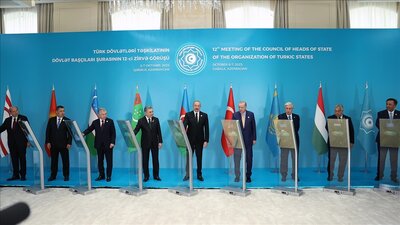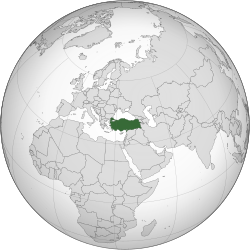07.10.25
Dr. Javid Veliyev, a member of the Board of Directors of the Center for International Relations Analysis, shared his views on the decisions adopted and the goals of the Organization of Turkic States (OTS) at the 12th Summit of the Heads of State.
The 12th Summit of the OTS Heads of State was held in Gabala, Azerbaijan, on October 6–7, 2025, under the theme “Regional Peace and Security.” During the summit, the OTS chairmanship was transferred from Kyrgyzstan to Azerbaijan. Given the high-level participation of all member and observer states, this summit can be considered one of the most significant gatherings in the history of the OTS.
At the end of the summit, the leaders adopted the Gabala Declaration, which consists of 121 points. Agreements were also signed to establish the “OTS+” format, to strengthen TURKSOY, and to carry out reforms within the Turkic Academy. Moreover, Turkmenistan was accepted as an observer to the Turkic Academy and the Turkic Culture and Heritage Foundation, while the Turkish Republic of Northern Cyprus (TRNC) was granted observer status in the Turkic Academy.
The Significance of Hosting the Summit in Azerbaijan
The OTS consists of three major geopolitical regions: Anatolia, the South Caucasus, and Turkestan. Among them, Azerbaijan, as the leader of the South Caucasus, plays a special role as a unifying center of the Turkic world. The most reliable connection between Turkestan and Türkiye also runs through Azerbaijan. The OTS now aims to realize this strategic objective through the Middle Corridor project.
Azerbaijan, which considers relations with the OTS a priority direction of its foreign policy, seeks to strengthen the organization and turn it into a global actor. Considering the presence of other regional organizations, this effort is highly significant. President Ilham Aliyev emphasized this point, stating: “Our family is the Turkic world; we have no other family.”
Thus, in recent years, Azerbaijan has been actively cooperating with Turkic states not only within the OTS framework but also bilaterally. Azerbaijan has alliance agreements or declarations with four countries, three of which are Türkiye, Kazakhstan, and Uzbekistan. Viewing the Turkic world as a key political direction has become a shared consensus among both the political elite and the general public in Azerbaijan.
Coordination in Foreign Policy
The Gabala Declaration emphasized mutual understanding and support in various foreign policy matters. The following initiatives were highlighted:
- Opening the Zangezur Corridor and ensuring unrestricted connectivity between Azerbaijan and Nakhchivan;
- Supporting the reconstruction of liberated territories through the Azerbaijan–China–Kyrgyzstan–Uzbekistan railway project;
- Paying attention to Afghanistan’s security and maintaining stability in the Turkestan region;
- Expressing solidarity with the Turkish Cypriot people and underlining their importance as part of the Turkic world;
- Supporting security and reconstruction efforts in Syria.
These steps were also regarded as important foreign policy initiatives for Türkiye.
One of the key points of the declaration was the establishment of a Consular Cooperation Platform, aimed at simplifying consular services, protecting citizens abroad, and enhancing coordination among member states. This initiative allows OTS member states’ consulates to provide mutual services to all citizens of member countries.
https://www.aa.com.tr/tr/analiz/tdt-12-zirvesi-masada-hangi-konular-vardi/3711014









